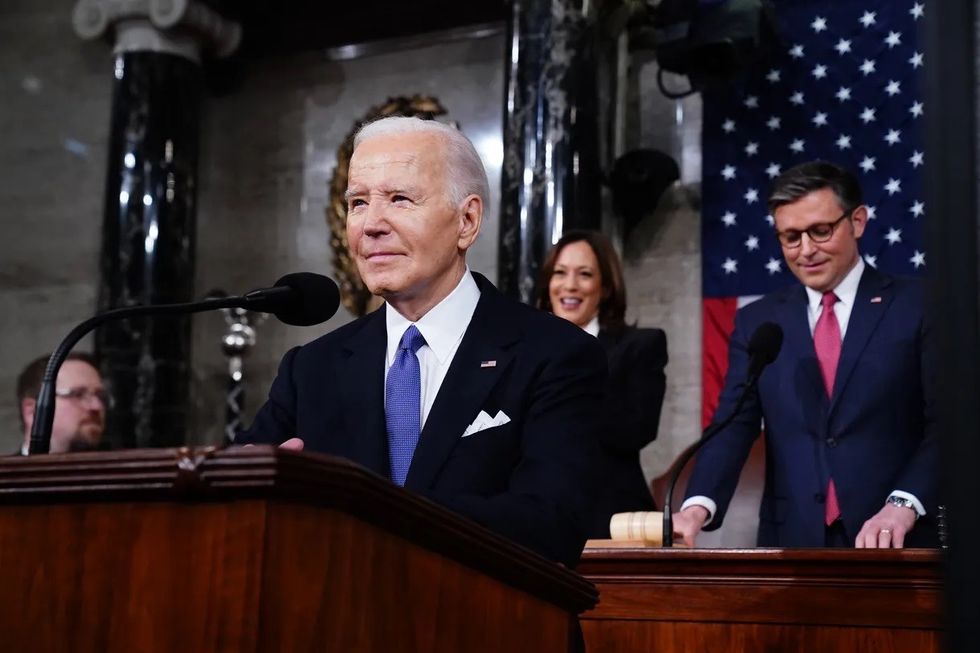PRESIDENT BIDEN’S STATE of the Union address before Congress on March 7 touched on several issues hotel industry associations have been advocating for a while. AAHOA and the American Lodging and Hotel Association both issued responses to the speech and AAHOA held its 2024 Spring National Advocacy Conference during the week of March 14.
The issues at hand include the extension of tax credits, handling of junk fees for greater disclosure and transparency and raising the federal minimum wage. During SNAC, more than 200 AAHOA leaders and members spent two days in Washington, D.C. The conference opened with a legislative learning session at the Ronald Reagan Building and International Trade Center, followed by an evening Congressional Reception at the Cannon House Office Building and then a full day of Congressional meetings.
“Each year we continue to see the relationships grow between our AAHOA Members and their elected officials,” said Laura Lee Blake, AAHOA president and CEO. “Our twice-yearly advocacy conferences are quickly becoming the foundation for shaping and driving national policy, and our members are making it happen.”
Nearly 30 members of Congress met with the AAHOA delegation, including Republican Sen. Roger Marshall of Kansas and California Democrat Congressman Ro Khanna. Marshall is a co-sponsor of the Credit Card Competition Act that will promote fee, security, and service competition among credit card networks, and which AAHOA supports. Khanna, the son of Indian immigrants, told the AAHOA members that representation is crucial to serving Indian-American communities and strengthening America's economic and strategic partnership with India, such as AAHOA’s “Made in India” initiative.
“As a champion of advocacy and building relationships with elected officials, AAHOA is proud to advocate on behalf of the hotel industry in the halls of Congress,” said Bharat Patel, AAHOA chairman. “SNAC provides AAHOA leaders the opportunity to learn about the issues impacting our industry and prepares them to have productive, impactful meetings with their elected officials on Capitol Hill. AAHOA’s reputation, influence, and recognition in Washington continues to grow, and it is thanks to the AAHOA members who take the time to make advocacy a part of their business plan.”

The issues
Along with the Credit Card Competition Act, top issues for AAHOA include expanding access to capital by increasing the SBA loan limit to $10 million and supporting the LIONS Act. The association also supports the Overtime Pay Flexibility Act and the SEASONAL Act as means to address the ongoing labor shortage.
“AAHOA is strategically positioned to address these pivotal issues at SNAC,” Blake said. “As our members confront escalating challenges, there has never been a more opportune moment for AAHOA to be in our nation’s capital. We will continue to articulate our concerns, establish meaningful relationships, and lay the groundwork for impactful change in the years ahead.”
Biden’s state of the union address did not address every issue that concerns AAHOA members, Patel said.
“President Biden's address touched on topics such as tax credits, junk fees, and plans for increasing the federal minimum wage; however, AAHOA members are currently grappling with the tangible impacts of rising inflation, a decline in corporate travel, acute workforce shortages, soaring property insurance rates, and escalating prices for goods and services,” Patel said. “AAHOA remains committed to upholding our reputation as some of the nation's most informed, engaged, and knowledgeable association members in Washington, D.C.”
AHLA pursues labor relief, fee regulation
After Biden’s speech, AHLA released its own legislative agenda.
“While AHLA’s outlook for the future of the hotel industry is optimistic, hoteliers are facing a number of hurdles at the federal level,” AHLA said. “These include labor shortages, stubborn inflation, and a host of federal regulations that are tying hoteliers up in red tape.”
AHLA’s priorities include:
- Supporting the Hotel Fees Transparency Act and the No Hidden Fees Act that would create a single fee-display standard for all lodging businesses, including hotels, online travel agencies, metasearch sites and short-term rental platforms.
- Seeking legislation to overturn the National Labor Relations Board’s joint-employer regulation, which makes it more likely that hotel franchisers can be held responsible for employees at franchised hotels.
- Challenging the U.S. Department of Labor’s proposed overtime-pay regulation and regulation that changes the way workers are classified as independent contractors or employees.
- AHLA last year lobbied the General Services Administration for a $9 increase to the fiscal year 2024 per diem lodging rate that will generate an estimated $300 million for hoteliers. It will push for another increase in fiscal year 2025 to account of persistent inflation.
- Expanding and streamlining the legal H-2B guestworker program to help independent hotels and resorts in remote vacation destinations fill seasonal roles.
- Passing the Asylum Seeker Work Authorization Act that would allow the historic number of asylum seekers already housed in hotels across America to work as soon as 30 days after applying for asylum.
- Supporting the H-2 Improvements to Relieve Employers Act that would expand the H-2A/H-2B labor certification period to three years and permanently authorize the waiver of in-person interviews for returning workers.
- Urging passage for the Tax Relief for American Families and Workers Act, in the Senate that includes extensions of business interest deductibility and bonus depreciation, tax policies that AHLA says support hotels’ ability to weather crises, invest for the future and compete in the marketplace.

















